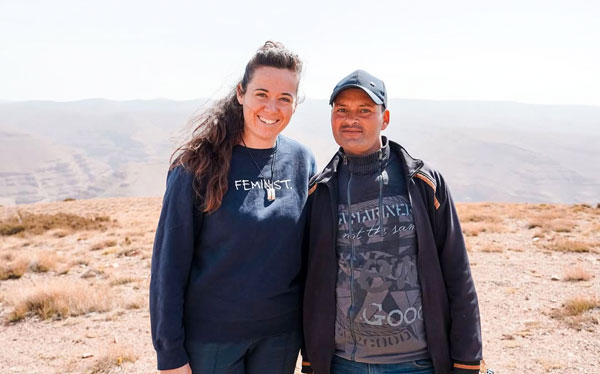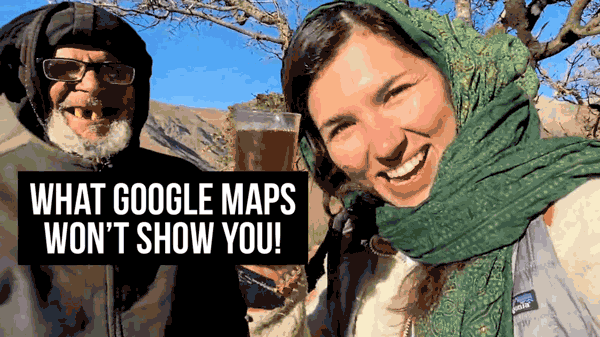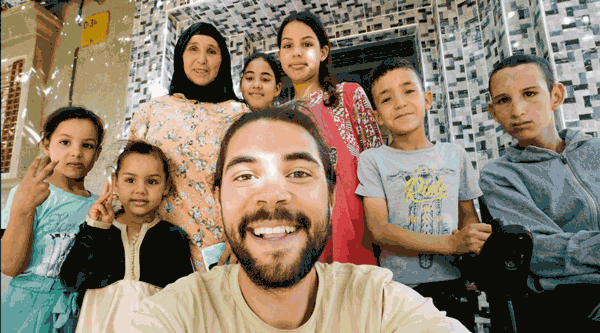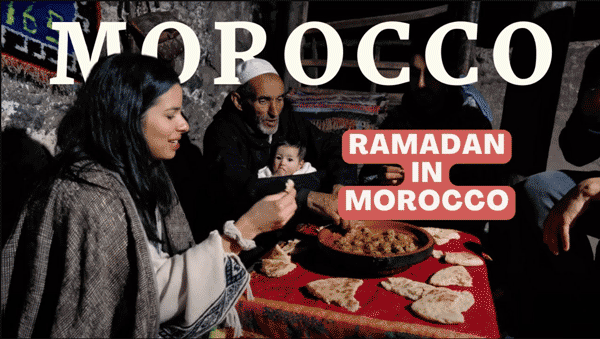
The Warmth of Moroccan Berber Hospitality with Real Tourists Stories
High in the rugged Atlas Mountains and across the sweeping Sahara landscapes of Morocco live the Berbers, or Imazighen” free people” whose presence predates the Arab conquest and even Roman colonization. Among the most cherished elements of their culture is hospitality, a sacred tradition deeply woven into the fabric of Berber life. This article explores how this timeless value manifests among three key tribes: the Ait-Atta, Ait-Khabach, and Ait-Merghad, drawing on real stories and lived experiences.
The Symbolism of Tea
The tea ritual itself is deeply symbolic. Prepared with patience and served in three rounds, each cup carries a meaning: the first bitter like life, the second strong like love, and the third sweet like death. In the Berber worldview, to offer tea is to offer time, presence, and respect.

Ait-Atta Tribe: Hospitality in the Jbel Saghro and Draa Valley
The Ait-Atta, descendants of the Sanhaja confederation, reside primarily in the southeastern regions of Morocco, particularly around Jbel Saghro and the Draa Valley. Known for their fierce independence and adaptability to arid lands, the Ait-Atta are semi-nomadic and maintain tight communal bonds.
Their hospitality is practiced not in grand halls but in humble tents, mud-brick kasbahs, or open courtyards. A guest is immediately seated, served tea, and shaded from the sun. Conversation begins only after ensuring the guest’s comfort.
Pride in Giving
Giving the best to a guest is a source of pride—from hand-churned butter to the family’s finest couscous, nothing is held back. Even shepherds in remote regions will share their scarce provisions without hesitation, reflecting a culture where generosity defines one’s worth.
EXPERIENCE THE HEART OF BERBER HOSPITALITY
From the stunning peaks of the Atlas Mountains to the warm, welcoming homes of the Amazigh people, every journey through Berber regions offers a unique blend of culture, history, and genuine human connection. Whether you’re sharing a cup of fresh mint tea or gathering around a traditional tagine, the warmth of Berber hospitality is unforgettable.
Don’t just visit – immerse yourself in the true spirit of Morocco.
welcomed like family: tourists share true Stories of The Warmth of Moroccan Berber Hospitality
Olivia and Mohamed: A Glimpse of Amazigh Hospitality
“We were high in the Atlas Mountains, 2,800 meters above sea level, when we met him—by pure chance. The morning sun barely broke over the peaks when Mohamed appeared from the valley below, carrying supplies to his father, a shepherd who lives alone in the remote gorges. He comes here once a week, walking over 30 kilometers on foot, just to bring his father bread, water, and care.
We were two women traveling across Africa in a converted Defender. Our journey had already taken us through the familiar paths of Marrakech and Merzouga. But this? This was something else entirely.
When Mohamed approached us, we were cautious. After all, we were alone in a wild, isolated part of the mountains. But his presence was gentle, his voice kind, and before we knew it, we were walking side by side, carrying firewood and straw, heading down the steep trails to meet his father.
Brahim, the father, was already far off with the flock—too far for us to meet him that day. Still, Mohamed showed us their world: a life without electricity or roads, where even straw must be hauled on one’s back. Their home? A stone shelter in the cliffs. Their wealth? A flock of sheep, a few bags of barley, and a soul full of dignity.
When it was time for Mohamed to return, he said nothing dramatic. No goodbye, no speech. He simply disappeared into the mountain again, as if he were part of it.
But before we left, his friend Ismael—a young shepherd no older than 24—invited us to his hut for tea. He had little: a kettle, a solar panel, some dry twigs for fire. But what he had, he gave.
He insisted we take apples. We hesitated, feeling guilty. We had everything in our car—food, money, comfort. But refusing would have been an insult. Among the Amazigh, to give is to honor the other. You do not barter kindness.
That day, we learned that hospitality here is not an act—it is a way of being. These men, who live far from the world’s gaze, gave more than any luxury hotel or polished tour. They gave their time, their trust, and a glimpse of a life built on resilience and quiet generosity.
It’s a story we will carry forever. A reminder that in the high solitude of the Atlas, strangers are not threats—they are guests. And sometimes, guests become part of the story.
Discover the story – watch now!
What exactly she wrote on her Instagram:
“It’s 7 a.m. The alarm rings. We convinced ourselves to get up early to catch the first light of day over the mountains surrounding us. The day before, we found an incredible spot to camp.
I poke my head out of my sleeping bag and see, in the distance, a man sitting next to his donkey. He calls out a “good morning” from afar. The silence is so profound that we hear him as if he were right next to us. “Do you want some bread?” he asks. Thinking he’s a wandering vendor like many we’ve seen, we walk over to buy some from him.
But that’s not the case at all. We meet Mahmed. He firmly refuses our money and simply wants to give us his bread. It’s 7:30 in the morning, and Mahmed has already walked for three hours from his village at the base of the mountain. He’s on his way to join his father, Brahim, a 55-year-old shepherd who lives alone at the bottom of the canyon with his flock of sheep.
Mahmed makes this journey once a week to bring supplies to his father. We take the time to talk to him and learn a bit about his life. And after a long conversation, when our instincts tell us that we can trust him, we ask if we can join him.
There are about 2 kilometers left to walk, descending the entire canyon, and we want to discover more. Mahmed happily agrees, and off we go for an incredible day by his side.”

Ava Among the Amazigh: A Lesson in Hospitality
While traveling through the majestic Atlas Mountains of Morocco, Ava, a curious traveler, embarked on a unique journey to experience the famed Berber hospitality firsthand. She arrived in a remote village, guided by a local teenager named Ismail, after a seven-hour trip from Marrakech. The village, so small and secluded that it doesn’t even appear on Google Maps, became Ava’s home for the next three days.
Upon arrival, Ava was welcomed by Khadijah, a member of an Amazigh family, known to the world as Berbers. True to their renowned hospitality, the family immediately offered her traditional tea, a ritual that marks the arrival of a guest. Ava was shown around the simple yet charming house, with its central courtyard, cozy guest room adorned with carpets, and low, cool storage rooms essential for hot Moroccan summers.
One of the most memorable experiences was learning the art of bread-making from Khadijah. Ava tried to knead the dough but quickly handed the task back to the expert after realizing how challenging it was. She marveled at how Khadijah baked the bread in a traditional oven, skillfully sticking the dough to the walls of the clay oven with her bare hands despite the intense heat.
The family’s hospitality extended beyond food. When it was time to sleep, Ava was graciously accommodated in the house of a cousin, as it would not have been appropriate for her to stay where the men and boys were residing. Despite the simplicity and modesty of their lives, the family’s warmth made Ava feel welcome and at ease.
During her stay, Ava participated in daily activities, like preparing a hearty tagine with vegetables and chicken, shared among family members who ate together using bread as a utensil. The breathtaking mountain hikes with Ismail and his cousin Abdul Karim further revealed the harmonious relationship between the Amazigh people and their rugged, beautiful surroundings.
Ava reflected on the profound kindness she had experienced. The family did not hesitate to welcome her—a foreigner, different in appearance and language. Their generosity went beyond mere politeness; it was a genuine openness of heart. To them, welcoming a guest was not just a duty—it was an honor, a principle deeply rooted in their way of life.
When Ava finally left the village, she couldn’t help but feel touched by their willingness to embrace a stranger as one of their own. Through this experience, she realized that Berber hospitality is not just a cultural tradition but a testament to the enduring human spirit of kindness.
Discover the story – watch now!

The Van, the Village, and a Stranger’s Welcome
While traveling through Morocco in his van, a young adventurer found himself drawn to the country’s vibrant culture and warm-hearted people. One day, inspired by the sight of locals hitchhiking along winding mountain roads, he decided to start offering rides to strangers, hoping to connect with people in a more meaningful way.
During one of these rides, he picked up two older Amazigh women. Despite the language barrier, their laughter and lively conversation filled the van, creating an instant connection. After a winding journey through rugged terrain, the women invited him to their village. Unsure of what to expect but trusting the warm energy of his new companions, he decided to follow them.
Upon arriving, he was immediately surrounded by curious children, their wide eyes reflecting both surprise and excitement at the unexpected visitor. The women led him through narrow alleys and up stone steps to their home, where he was welcomed as if he were a long-lost relative. Though words were few, the kindness in their gestures spoke volumes.
Within minutes, the family had prepared a tray of freshly brewed mint tea, a symbol of Moroccan hospitality. Plates of apples and oranges quickly followed, filling the small room with the sweet fragrance of freshly picked fruit. As he sipped his tea, surrounded by laughter and the playful chatter of children, he felt a deep sense of gratitude for this unexpected moment of connection.
Later, when he mentioned that he planned to sleep in his van, the family wouldn’t hear of it. They insisted he take a room in their home, even preparing a mosquito net to ensure his comfort through the night. As he lay down to rest, he reflected on the kindness of his hosts, overwhelmed by their generosity despite having just met.
The next morning, he woke to the gentle sounds of family life. Fatima, one of the women he had given a ride to, gave him a tour of the modest yet charming home, proudly showing off their small kitchen, traditional cooking tools, and even the outdoor washing area. Breakfast soon followed, a hearty meal of fresh bread, homemade butter, and sweet honey, shared around a low table as the morning sun warmed the cool mountain air.
As he prepared to leave, his hosts insisted on sharing one last meal with him, a touching gesture that emphasized the deep respect and affection they felt for their guest. Though the farewell was bittersweet, he left with a heart full of gratitude, reminded of the kindness and warmth that still exists in the world.
As he drove away, he realized that these moments—unplanned, unscripted, and profoundly human—were the true essence of travel. In the end, he had not just visited a Moroccan village; he had become part of a Moroccan family, if only for a brief and beautiful moment.
Discover the story – watch now!

In the Heart of the Atlas: Ramadan with an Amazigh Family
Nestled in the towering peaks of the Atlas Mountains lies the small village of Imlil, home to the indigenous Amazigh people. As the traveler made his way through the rocky paths, he met Larkan, a local mountain guide, who kindly invited him to visit a nearby Amazigh family for a taste of their culture during the holy month of Ramadan.
Arriving at the family’s traditional home, the traveler was warmly welcomed. The simple, sturdy house, made of earth and stone, blended seamlessly into the rugged landscape. Inside, the air was filled with the comforting aroma of freshly baked bread, a staple in every Amazigh household. The family proudly showed him how they still bake their bread the old-fashioned way, using a wood-fired oven that gives the bread its unique, rich flavor.
As the sun dipped below the jagged peaks, the call to prayer echoed across the valley, a sacred signal for the family to gather for iftar, the meal to break their day-long fast. Sitting together on the floor, they shared a hearty spread of dates, fresh bread, homemade tagine, and sweet mint tea, all prepared with care and tradition.
The traveler noted how the family’s deep connection to their land and customs had created a sense of peace and warmth that felt worlds away from the bustling streets of Marrakech. Here, life flowed to the rhythm of the mountains, and hospitality was a natural part of everyday life.
As the traveler bid farewell to his hosts, he left with a deeper appreciation for the Amazigh way of life – a life defined by simplicity, tradition, and an unwavering sense of community.
Discover the story – watch now!

Lahcine’s Desert Welcome: An Unexpected Friendship in Tafilalt
In the vast, arid expanse of southeastern Morocco, near the old caravan routes of Tafilalt, a French traveler and journalist found himself living a story he would never forget. Far from hotels or guided tours, he was searching for something deeper—an encounter with the soul of the land and its people.
As he wandered into a small Amazigh (Berber) village inhabited by the Aït Khebbach tribe, he was warmly welcomed by a local man named Lahcine. Despite the simplicity of his home, Lahcine offered him a meal and a place by the fire as if hosting a long-lost friend. The traveler was surprised by the generosity—this was not a planned visit, but an act of spontaneous hospitality.
That night, Lahcine prepared spaghetti with tomato and onion sauce over an open fire and shared stories by lamplight. He even taught the visitor local superstitions—how the presence of salt in food keeps mischievous spirits, the jnoun, away. As they laughed and shared tea brewed the traditional way, a connection was forged that transcended language.
The next day, the host invited the traveler to join him in a hot-air balloon flight—a thrilling and slightly chaotic adventure across the desert. After a rocky landing, full of humor and minor scolding, the two men laughed like old friends. Later, the journey led to a nomadic camp near Mount Zireg, where a semi-nomadic family welcomed him into their tent, offered camel milk, and gifted him a cheche (traditional turban) to protect him from the sun.
Three generations lived together in a single tent made of camel wool, with roles clearly defined and harmony reigning in simplicity. The traveler was struck by how little these people had, yet how much they gave. They shared not only food and shelter, but a worldview rooted in dignity, endurance, and community.
As he left the desert behind, he carried with him more than memories—he carried the essence of Amazigh hospitality: generous, humble, and profoundly human.
The Warmth of Tizi n’Ait: A Journey into Berber Hospitality
In the heart of the High Atlas Mountains, nestled among terraced fields and ancient stone dwellings, lies the village of Tizi n’Ait. Life here moves to the rhythm of the sun and the seasons, and the traditions of the Amazigh people are woven into every aspect of daily life.
One crisp morning, a traveler named Samir arrived in Tizi n’Ait, weary from his journey through the rugged terrain. As he approached the village, he was greeted by the scent of baking bread and the distant sound of laughter. Despite being a stranger, Samir was welcomed with open arms by the villagers, a testament to the renowned Berber hospitality.
He was invited into the home of an elder named Amghar, who offered him mint tea a symbol of friendship and respect. As they sat on colorful cushions, Amghar shared stories of the village’s history, the significance of the surrounding mountains, and the customs that bound the community together.
That evening, the village gathered for an Ahidus dance, a traditional Berber performance featuring rhythmic drumming, chanting, and synchronized movements. Samir watched in awe as men and women, dressed in vibrant attire, moved in harmony under the starlit sky.
During his stay, Samir learned about the Aït Atta tribe, known for their resilience and rich cultural heritage. He visited the nearby village of N’Kob, famous for its 45 kasbahs and lush palm oases, and heard tales of the historic Battle of Bougafer, where the Aït Atta fiercely defended their land.
As days turned into weeks, Samir became part of the community, participating in daily chores, sharing meals, and forging bonds that transcended language and background. When it was time to leave, he was given a handcrafted silver pendant a token of friendship and a reminder of the warmth he experienced.
Back in the bustling city, Samir often found himself reminiscing about Tizi n’Ait. The genuine kindness, the shared stories, and the sense of belonging had left an indelible mark on his heart. He realized that in the remote corners of the Atlas Mountains, he had discovered not just a village, but a second home.
Moroccan Berbers or Amazigh People, a symbole of warmth hospitality
Across Morocco’s vast deserts and mountain villages, the Berber people continue to offer something increasingly rare in the modern world: unreserved, heartfelt hospitality. Their warmth is not performative—it’s foundational, a living expression of cultural pride and spiritual duty. As travelers recount their experiences, what resonates is not just the generosity of food or shelter, but the sincerity behind every gesture.
In a time when many are wary of strangers, the Berber way offers a quiet challenge: to greet the unknown not with suspicion, but with welcome. Whether you walk their paths someday or simply carry their example, there is something enduring to be learned.
As a Berber proverb reminds us, “The guest is a blessing – even if he brings nothing, he brings baraka.”
